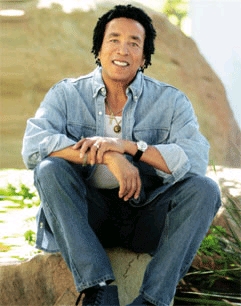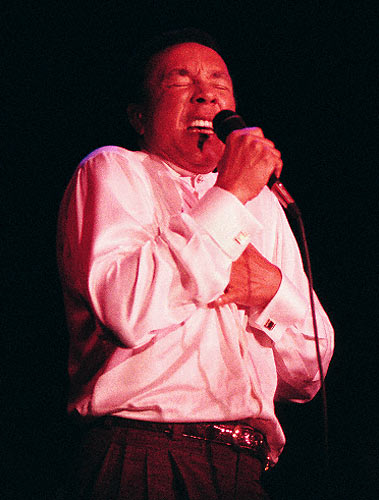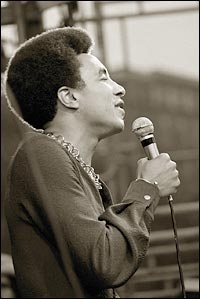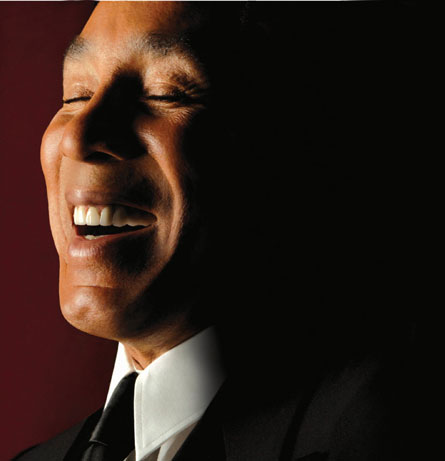SMOKEY ROBINSON / “Quiet Storm”
Love is my favorite subject to write about. You see, love is the only thing that’s there that I can think of that will be everlasting, and I want to write everlasting songs. —William ‘Smokey’ Robinson
 What can one say? This recording spawned a whole genre of popular music. Radio shows were named for it. The slightly oxymoronic title became a euphemism for engaging in a bliss-filled, passionate night of sensual pleasure. How can a storm be quiet? Oooohhhh and Sssssssshhh!
And that cover. Smokey stooping in a clearing, a black horse grazing nearby in the background. Everything seems peaceful. Where’s Smokey’s partner? Nice setting, no woman. What gives?
Yes, deep love always has an element of mystery, even if it’s only: how did “they” get together? Without directly illustrating the concept, the cover is a perfect picture, or at least seems to work on a subliminal level, which is precisely the way Smokey’s songs do what they do.
What can one say? This recording spawned a whole genre of popular music. Radio shows were named for it. The slightly oxymoronic title became a euphemism for engaging in a bliss-filled, passionate night of sensual pleasure. How can a storm be quiet? Oooohhhh and Sssssssshhh!
And that cover. Smokey stooping in a clearing, a black horse grazing nearby in the background. Everything seems peaceful. Where’s Smokey’s partner? Nice setting, no woman. What gives?
Yes, deep love always has an element of mystery, even if it’s only: how did “they” get together? Without directly illustrating the concept, the cover is a perfect picture, or at least seems to work on a subliminal level, which is precisely the way Smokey’s songs do what they do.
 Smokey’s music is full of tender hooks.
This is solo Smokey. The Miracles have broken up. Motown has made it to Hollywood. Smokey is a vice-president. He has carte noir—he can do whatever he wants. So what does he want to do?
Smokey’s music is full of tender hooks.
This is solo Smokey. The Miracles have broken up. Motown has made it to Hollywood. Smokey is a vice-president. He has carte noir—he can do whatever he wants. So what does he want to do?
 Unusual in pop music, Smokey successfully launches a second act. Gone are the thematically simple albeit emotionally true love songs. No more “My Girl” and “Ooh Baby, Baby.” We’re deep into adult territory now, well past the first blush and the rush of that first great affair. Indeed, in Smokey's new songs, the children are sometimes grown with children of their own. You might call it love songs for parents and new grandparents.
By the late eighties and nineties, the music industry would become youth obsessed. There are no more quiet storms: except, perhaps, you could argue that Maxwell is mining that groove. And speaking of which, has anybody heard from Maxwell lately? But even there, it’s the passionate affair of singles getting together, struggling to become a couple. Smokey was into something way beyond that.
Unusual in pop music, Smokey successfully launches a second act. Gone are the thematically simple albeit emotionally true love songs. No more “My Girl” and “Ooh Baby, Baby.” We’re deep into adult territory now, well past the first blush and the rush of that first great affair. Indeed, in Smokey's new songs, the children are sometimes grown with children of their own. You might call it love songs for parents and new grandparents.
By the late eighties and nineties, the music industry would become youth obsessed. There are no more quiet storms: except, perhaps, you could argue that Maxwell is mining that groove. And speaking of which, has anybody heard from Maxwell lately? But even there, it’s the passionate affair of singles getting together, struggling to become a couple. Smokey was into something way beyond that.
 It’s the middle of the seventies. Two albums in succession: Pure Smokey (1974) and A Quiet Storm (1975). If there is a golden age of R&B/Soul Music, this is it. The seventies were also a time of heightened consciousness. Smokey sports an immaculate natural on both covers. A clear statement of where he’s coming from.
From Pure Smokey we get “The Love Between Me And My Kids.” The set up is a man calls the home of his ex, whom has remarried, and speaks to her husband. My man doesn’t want to cause no trouble and he respects the new relationship, he just wants to see his kids. That’s a long way from rhyming moon and June. Then there’s “Virgin Man,” which is a long way from The Mack, Superfly Lover, black man as stud, etc., etc., ad nauseam. And finally “She’s Only A Baby Herself,” brother man is singing about his sixteen year-old pregnant daughter. This was a seventies pop album!
Then came the genre establishing A Quiet Storm from which we select three cuts: “Quiet Storm,” “The Agony And The Ecstasy” and “Baby That’s Backatcha.”
It’s the middle of the seventies. Two albums in succession: Pure Smokey (1974) and A Quiet Storm (1975). If there is a golden age of R&B/Soul Music, this is it. The seventies were also a time of heightened consciousness. Smokey sports an immaculate natural on both covers. A clear statement of where he’s coming from.
From Pure Smokey we get “The Love Between Me And My Kids.” The set up is a man calls the home of his ex, whom has remarried, and speaks to her husband. My man doesn’t want to cause no trouble and he respects the new relationship, he just wants to see his kids. That’s a long way from rhyming moon and June. Then there’s “Virgin Man,” which is a long way from The Mack, Superfly Lover, black man as stud, etc., etc., ad nauseam. And finally “She’s Only A Baby Herself,” brother man is singing about his sixteen year-old pregnant daughter. This was a seventies pop album!
Then came the genre establishing A Quiet Storm from which we select three cuts: “Quiet Storm,” “The Agony And The Ecstasy” and “Baby That’s Backatcha.”
 Rather than focus on the lyrics and the content, let me say a word here about the beauty of Smokey’s falsetto crooning. The way he worked that vibrato, you know, that subtle quiver that indicates both sincerity and vulnerability. Smokey has an unhurried, languid approach to reciting the lyrics. A way of whispering some of the words and then doing that little catch-in-his-throat moan that approaches but never quite reaches the volume of a wail.
I think this period offers some of Smokey’s best vocal work.
Deep songs beautifully sung. Classics. That’s it. No more need be said.
—Kalamu ya Salaam
That wicked falsetto
I love Smokey's voice, of course. It's kind of difficult to be a fan of R&B music without falling for that wicked falsetto of his. That said, I've never heard most of these songs. I do have a lot of material from the Miracles and I have a few of Smokey's big hit records, but records like "Virgin Man" and "The Love Between Me And My Kids" are new to me. The latter record is very interesting. I dig the lyrics more than I like the execution. Overall, it's a decent record though. Now, "Virgin Man"? That one is wild. I don't think I've ever heard those sentiments expressed in any venue, let alone in a pop song. "Can you love a virgin man?" Wow. That's out there a minute. "She's Only A Baby Herself" is wild too, but in a different way. The sentiment is less original - I've heard it expressed any number of times and in any different number of forums - but Smokey brings to the subject a plain-talking, introspective perspective that really allows you to put yourself in his (or any father's) shoes. And through his words, you can also see the perspective of his daughter and even the perspective of the kid who's about to be a father himself.
Of course, "Quiet Storm" is the stone-cold classic of this bunch, and like Kalamu said, it's a record that eventually created its own genre. When I was a teenager in New Orleans, the biggest local R&B station was FM-98, WYLD. Every night at around seven or eight, they'd kick off what they called 'The Quiet Storm.' Then they'd start playing records like Rick James & Teena Marie's "Fire And Desire," Anita Baker's "Angel," Prince's "Do Me, Baby," Shirley Murdock's "As We Lay," and so on and so on. All those melodramatic, hyper-emotional, slowed-down love jams. The genre existed before Smokey, but when Smokey dropped "Quiet Storm," it's was as if he redefined what a slow jam actually was. His phrase became the genre.
So how crazy is it that "Quiet Storm" isn't even my favorite song of the album? Crazy, I know, but my favorite jam from the Quiet Storm LP is actually "The Agony And The Ecstacy." I like that one because it has that realism. It still has the sexy, honey-sweet, pillow-soft vibe that every good slow jam has to have, but the lyrics tell it like it really is: "Love like ours is never free / You gotta pay some agony for the ecstacy." Now, that's real. Nobody reading this has ever experienced the highs of love without experiencing the lows. When it comes to love songs, Smokey is the man.
—Mtume ya Salaam
Rather than focus on the lyrics and the content, let me say a word here about the beauty of Smokey’s falsetto crooning. The way he worked that vibrato, you know, that subtle quiver that indicates both sincerity and vulnerability. Smokey has an unhurried, languid approach to reciting the lyrics. A way of whispering some of the words and then doing that little catch-in-his-throat moan that approaches but never quite reaches the volume of a wail.
I think this period offers some of Smokey’s best vocal work.
Deep songs beautifully sung. Classics. That’s it. No more need be said.
—Kalamu ya Salaam
That wicked falsetto
I love Smokey's voice, of course. It's kind of difficult to be a fan of R&B music without falling for that wicked falsetto of his. That said, I've never heard most of these songs. I do have a lot of material from the Miracles and I have a few of Smokey's big hit records, but records like "Virgin Man" and "The Love Between Me And My Kids" are new to me. The latter record is very interesting. I dig the lyrics more than I like the execution. Overall, it's a decent record though. Now, "Virgin Man"? That one is wild. I don't think I've ever heard those sentiments expressed in any venue, let alone in a pop song. "Can you love a virgin man?" Wow. That's out there a minute. "She's Only A Baby Herself" is wild too, but in a different way. The sentiment is less original - I've heard it expressed any number of times and in any different number of forums - but Smokey brings to the subject a plain-talking, introspective perspective that really allows you to put yourself in his (or any father's) shoes. And through his words, you can also see the perspective of his daughter and even the perspective of the kid who's about to be a father himself.
Of course, "Quiet Storm" is the stone-cold classic of this bunch, and like Kalamu said, it's a record that eventually created its own genre. When I was a teenager in New Orleans, the biggest local R&B station was FM-98, WYLD. Every night at around seven or eight, they'd kick off what they called 'The Quiet Storm.' Then they'd start playing records like Rick James & Teena Marie's "Fire And Desire," Anita Baker's "Angel," Prince's "Do Me, Baby," Shirley Murdock's "As We Lay," and so on and so on. All those melodramatic, hyper-emotional, slowed-down love jams. The genre existed before Smokey, but when Smokey dropped "Quiet Storm," it's was as if he redefined what a slow jam actually was. His phrase became the genre.
So how crazy is it that "Quiet Storm" isn't even my favorite song of the album? Crazy, I know, but my favorite jam from the Quiet Storm LP is actually "The Agony And The Ecstacy." I like that one because it has that realism. It still has the sexy, honey-sweet, pillow-soft vibe that every good slow jam has to have, but the lyrics tell it like it really is: "Love like ours is never free / You gotta pay some agony for the ecstacy." Now, that's real. Nobody reading this has ever experienced the highs of love without experiencing the lows. When it comes to love songs, Smokey is the man.
—Mtume ya Salaam
This entry was posted on Monday, March 24th, 2008 at 12:02 am and is filed under Classic. You can follow any responses to this entry through the RSS 2.0 feed. You can leave a response, or trackback from your own site.
6 Responses to “SMOKEY ROBINSON / “Quiet Storm””
March 24th, 2008 at 9:57 am
Haven’t finished checking out the music yet, but I wanted to add a few points:
1) For a study in someone else banking on that “wicked falsetto,” see the Teena Marie songbook. No surprise that she started on Motown, given that she was so obviously influenced by Smokey’s style.
and
2) The originator of the beloved “Quiet Storm” radio format was the late great Melvin Lindsey, of DC’s WHUR-FM. I had a HUGE crush on him as a kid, and Dyana Williams still speaks glowingly of Melvin’s vast contribution to Black radio by making it OK for folks to relax to a solid block of love music on the airwaves every evening.
March 24th, 2008 at 11:28 am
“carte noir” what a term. 🙂
Thanks Stephanie…you said mostly everything I would have said. Marvin Gaye also has a wicked falsetto, and even sings backup on his own tunes. Aaron Nevile also comes to mind.
Okay, but since this is a blog about Smokey, his writing seems always better than his singing. This is not saying that I don’t like his singing, but as a lyricist, only Dozier, Gamble and Huff can compare.
For what its worth, the music for Quiet Storm isn’t passe either. It has some ethereal trancendental mood to it with a bassline to boot.
March 24th, 2008 at 11:48 pm
I just had to put my two cents on this one. In reference to “She’s Only a Baby Herself”, I can remember this song, along with Billy Paul’s “Let’s Make a Baby” was banned from radio airplay. A little too risque’ back in the day. Nowadays these two songs are considered TAME!!! Interesting how time changes things.
March 26th, 2008 at 9:54 am
I’m always amazed at how right he got it in these albums–and, considering his past at Motown and what was expected of him and other writer/producers in the 60s, how much he seems to have no regard for the pop chart with these songs. Marvin Gaye seems to make his 70s albums almost against the wishes of the company, but Smokey is the company and doing something all his own here. I wasn’t there, so I could be wrong, but neither one of the albums seem to be about selling albums. It’s like he really wants to make music for the sake of it, for the love of it–no pressure from Berry Gordy now that Motown’s president would rather be found on a movie set than a recording studio. I say all that, but I’m still a little confused by the hair. I’m not sure that the immaculate natural has anything to do with “where he’s coming from.” The jeri curl he moves to in the 80s, the twists in the late 90s when the man is in his 60s, seem like following the popular hairstyles of the times, which is what popular artists who actually sell records seem to do. Maybe the hair is all of what is Motown about Robinson as a recording artist at this point. Even Diana Ross had an afro on a couple of album covers in the 70s. I remember reading somewhere that she actually had a physical fight with Shelly Berger who wasn’t going to let her wear the wig on one of those covers. I don’t know if that’s about coming from anywhere in particular if her idol Robinson (you can hear just how much she imitates some of his crooning inflections listening to some of these songs) has an afro on his album covers. I say all this because on the album that’s really her, The Boss from 1979 (Ashford and Simpson), she’s sports the longest and most flowing perm she’s shown on a cover to that date–hair she hasn’t really gotten rid of since. In the 70s, there seems to me no explaining Motown’s four big hit solo artists–Gaye, Robinson, Ross, and Wonder. All that’s simple and obvious about them in the 60s and 80s gets complicated by the 70s.
June 5th, 2008 at 6:05 pm
I do kno,i lost respect for smokey when I accidentally played his song “being with you” backwards and heard
Yeah,sweet satan
It was clear as regular speaking
Freaked me out,because I loved Smokey
December 25th, 2008 at 11:53 pm
smokey’s voice, i listen 2 his songs every nite all of his slow songs, the oldies, the first time i saw him him in person, i lost my voice 4 three days, i am not a kid just your no. 1 fan. keep it up. your song really gonna miss you, really hits home, i lost my son Sharrieff in 1996, i listen 2 your music almost every nite.
Leave a Reply
| top |